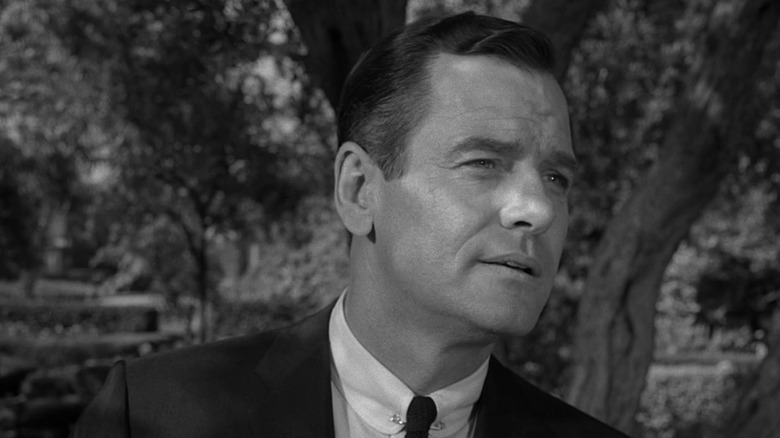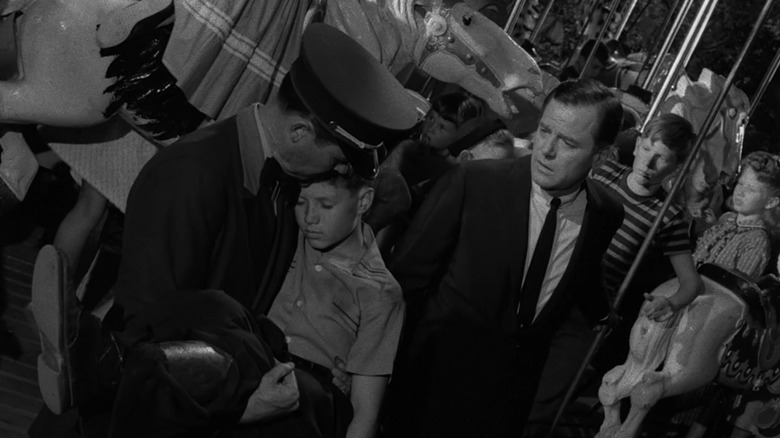The Twilight Zone Director Joe Dante's Favorite Rod Serling Episode Is An Emotional Feat
You're reading through another /Film article, an article not only of words and paragraphs but of insight; a journey into a wondrous website whose boundaries are those of editorial imagination. Next stop, reflecting on "The Twilight Zone."
Anthology television has existed before and after "The Twilight Zone," but few have continued to hold as much of a monumental impact on the pop culture zeitgeist as the lauded sci-fi series. Countless stories within Rod Serling's creation still strike a nerve through a contemporary lens. "The Monsters Are Due on Maple Street," for example, remains an essential episode and a scathing piece of political commentary that feels disturbingly prescient, as it concerns sowing communal distrust to distract from the bigger picture at hand. Serling wasn't afraid to convert social taboos into carnival mirrors that reflected our distorted anxieties back at us. It was a groundbreaking television achievement that left such an impression that some of its greatest fans would not only go on to become filmmakers, but they'd get to direct "Twilight Zone" stories of their own.
Joe Dante, the filmic mastermind behind "The Howling," "Gremlins," and "The 'Burbs," ended up dipping his toe into the Serling well twice with a segment in 1983's "Twilight Zone: The Movie" and an episode of the '80s revival series. Given how Dante transformed one of the great "Twilight Zone" episodes into an imaginative cavalcade of "Looney Tunes" horror, you'd think his favorite episode would be a real bugnuts choice, but he went with a surprisingly thoughtful entry with "Walking Distance" (via ComingSoon.net). It doesn't feature a huge plot twist, nor does it include any noteworthy makeup or special effects, but this is undoubtedly a great episode.
Gig Young plays Martin Sloan, the 36-year-old Vice President of an advertising agency who's frustrated with his many adult responsibilities. A casual summer drive leads him to a gas station that just so happens to be across from his childhood hometown of Homewood. With it being within walking distance, Martin goes for a little stroll down memory lane that he'll never forget.
Walking Distance takes a nostalgic stroll through the looking glass
We all confront our childhoods in very different ways, but Martin's introspection truly takes him beyond the limits of imagination. At first, he's pleasantly surprised at how much hasn't changed in the 20 years he's been away, such as the chocolate sodas he used to order at the local drugstore still costing only a dime. The further Martin drifts throughout Homewood, however, the more memories come flooding back to him. Everything looks really familiar, yet he doesn't seem to realize what's happened. Martin's entire perspective shifts when he starts reminiscing about carving his initials in a gazebo, only to see his younger self (Michael Montgomery) doing so in real time. It turns out that Martin's homecoming is the result of metaphysical time travel.
Dante notes Bernard Hermann's score as one of his selling points as it is one of his favorite episodes, and he's not wrong in its effectiveness. It carries the sentimentality of admiring a world long gone by, but there's also this haunting melancholy underscoring it. Hermann's music makes it clear that Martin is a man out of his element and, for as much as he reminisces on his childhood, he can never fully be at one with what's transpiring right in front of him. Homewood feels so alien to him at this stage in his life. It might as well be a memory of a memory, but in the "Twilight Zone," the unbelievable comes to life in ways that forever alter the people who inadvertently step through it.
Where "Walking Distance" really takes an emotional toll is in both instances of Martin attempting to get his parents to recognize him in his adult form. The first encounter is something out of the sequence in "It's a Wonderful Life" when George Bailey (James Stewart) keeps saying things only they would know to jog their memory, only to have their fear create even more problems. The desperation in Young's voice here is matched by his mother's (Irene Tedrow) achingly personal slap across the face for daring to insinuate he's her son. Even when Martin's father (Frank Overton) gives him the benefit of the doubt, it's a rather cold conversation. He acknowledges his son's otherworldly presence while imploring him to leave so as not to impress upon his younger self's summer, especially in the wake of a merry-go-round incident that results in a permanent limp. Serling may have reservations about the episode's approach, but it's a heartbreaking moment that lingers.
In "Walking Distance," nostalgia is utilized as a tool for reflecting on the past with the intention of looking ahead in life. You can never go home again. It just won't remember you the same way. Lessons like these can be found, as well as others, in "The Twilight Zone."
Every episode of "The Twilight Zone" is currently streaming on Prime Video, Paramount+, and Pluto TV.

